|
|
|
Sort Order |
|
|
|
Items / Page
|
|
|
|
|
|
|
| Srl | Item |
| 1 |
ID:
084672


|
|
|
|
|
| Publication |
2008.
|
| Summary/Abstract |
Recent events have led to a renewed scholarly interest in empire and the question whether the United States and its policies abroad constitute an "American Empire." This essay clarifies the various uses of the term and argues that conceptual overstretching retards scholarly analysis of the phenomenon. This essay suggests a definition of the term "empire" and provides an ideal-typical reference point to study its empirical variations. I provide a typology of empires to guide the analysis of common features as well as distinguishing characteristics. We can then answer the question whether contemporary manifestations might differ from their historical precursors. American unilateralist policy today differs in fundamental respects from previous imperial processes and structures. In contradistinction with earlier empires, U.S. policies lack the incentive structures for peripheral elites and local populations that typified imperial rule in the past. While falling short of constituting a formal empire, its policies face the same contradictions that confronted the western maritime empires as well as the USSR and which led to their dismemberment.
|
|
|
|
|
|
|
|
|
|
|
|
|
|
|
|
| 2 |
ID:
156100
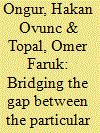

|
|
|
|
|
| Summary/Abstract |
This paper investigates whether the Turkish intellectual Cemil Meriç’s metaphor of silent yet peaceful communication among world literature classics on the same bookshelf might be employed in international political theory in contrast to traditional cosmopolitan or communitarian approaches, which favor either the particular or the universal in constructing social actors. Reviewing Meriç’s works and his conceptualizations of umran and irfan, we first inspect the underlying separation between what Meriç calls the processes of nationalism and nationalization. Meriç defines the latter as a form of people’s construction, which curiously echoes Ernesto Laclau’s definition of social articulations among conflicting particularities under a universal signifier. We then attempt to extend Meriç’s approach toward the international in order to transcend the Westphalian tradition in international relations and to reinterpret Andrew Linklater’s normative cosmopolitanism by lifting the prerequisite of dialogue among international actors for peaceful coexistence.
|
|
|
|
|
|
|
|
|
|
|
|
|
|
|
|
| 3 |
ID:
147712
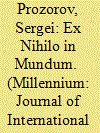

|
|
|
|
|
| Summary/Abstract |
In this reply to Vassilios Paipais’s review of my Void Universalism books I focus on two main points of my disagreement with Paipais. The first concerns the possibility of deriving universalist axioms of world politics from the ontology of the void discussed in the first volume, Ontology and World Politics. While Paipais rejects such a possibility and posits a contentless ontology of the political, I argue that it is possible to derive from void ontology the political axioms of community, equality and freedom understood as attributes of indiscernible ‘whatever being’. The second pertains to the limitations on the world-political subject addressed in the second volume, Theory of the Political Subject. While Paipais is entirely correct in arguing that my notion of political subjectivity combines purism on the level of content with prudentialism with regard to form, I demonstrate that this combination is not a contradiction but is rather the precondition of politics as free praxis, whereby the politicisation of particular worlds in accordance with universal axioms always remains up to the subject.
|
|
|
|
|
|
|
|
|
|
|
|
|
|
|
|
| 4 |
ID:
078485
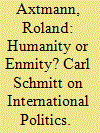

|
|
|
|
|
| Publication |
2007.
|
| Summary/Abstract |
This article reviews Schmitt's analysis of international politics from the period of the Weimar Republic to the early years of the German Federal Republic. It highlights the importance of Schmitt's opposition to Woodrow Wilson's policies and 'liberal' universalism more generally for his understanding of and engagement with international politics. Confronted with the decline of the state (the Ende der Staatlichkeit), Schmitt develops a concept of the political that is not tied in with the existence of the state. Schmitt embraces the fascist stato totalitario as a model for a 'qualitatively' strong state and the distribution of the earth into hegemonic Grossräume as the new nomos
|
|
|
|
|
|
|
|
|
|
|
|
|
|
|
|
| 5 |
ID:
105957
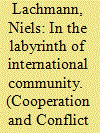

|
|
|
|
|
| Publication |
2011.
|
| Summary/Abstract |
The conceptualization of international community presents important challenges for the study of international relations. This article suggests that it is best considered as an attempt to build a universalistic framework through transnational practices that however remains challenged by particularistic dynamics, even though it is supposed to be common to all international actors. The article addresses both the complexity and the normative implications of community-building at the international level through the example of the Alliance of Civilizations, a programme of the United Nations which aims to promote intercultural understanding and thus to counter tendencies towards a 'clash of civilizations'. Among similar attempts, the late-1990s and early-2000s Dialogue among Civilizations appears both as a blueprint and as a measure of difference of outlook and development. The universalistic outlook of such efforts is challenged by the essential place of states, the singling out of tensions between the 'West' and the 'Muslim world' which points to exclusionary tendencies, and the reliance on security references to favour stakeholdership by international actors in the community-building attempt.
|
|
|
|
|
|
|
|
|
|
|
|
|
|
|
|
| 6 |
ID:
154384
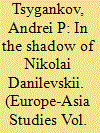

|
|
|
|
|
| Summary/Abstract |
In order to contribute to our understanding of Russian geopolitical theory, this article investigates closely the figure of Nikolai Danilevskii. The article pays special attention to the thinker’s increased influence on contemporary Russian geopolitical thought, by presenting qualitative and quantitative evidence of this influence. It explains Danilevskii’s rise by looking at Western pressures on Russia and the country’s internal vulnerabilities. Such vulnerabilities emerged from the breakup of the Tsarist and the Soviet state, respectively, by providing the required context for the emergence of defensive nationalist ideas.
|
|
|
|
|
|
|
|
|
|
|
|
|
|
|
|
| 7 |
ID:
108506
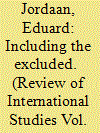

|
|
|
|
|
| Publication |
2011.
|
| Summary/Abstract |
Cosmopolitanism is frequently criticised for overlooking the situatedness of morality and the importance of solidarity in their aspiration to global justice. A number of thinkers take these criticisms seriously and pursue 'a communitarian path to cosmopolitanism'. Four such approaches are considered. All four view morality and justice as grounded in a specific social setting and hold that justice is more likely to result if there is some 'we-feeling' among people, but are simultaneously committed to expanding the realm of justice and moral concern to beyond national boundaries. To enable the theorisation of an expanded realm of situated justice and moral concern, community is conceived as not necessarily corresponding to political boundaries and the moral the self is seen as able and eager to loosen some of its traditional moral connections and to form new ones. Unfortunately, these approaches are likely to exclude significant segments of the world's population from the expanded realm of moral concern they theorise, most notably, a large proportion of the world's poor. It is suggested that the thought of Emmanuel Levinas might offer a way of reducing the gap between solidarity and moral universalism.
|
|
|
|
|
|
|
|
|
|
|
|
|
|
|
|
| 8 |
ID:
124975
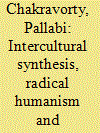

|
|
|
|
|
| Publication |
2013.
|
| Summary/Abstract |
Rabindranath Tagore imbued Indian dance and music with a new modern sensibility. He created novel and eclectic dance-and-music genres, Rabindranritya and Rabindrasangeet, when the national trend was toward classical revivalism. He inspired Indian women to dance on the national stage at a time when dance was associated with immorality and cultural degeneration. This article explores Tagore's song and dance creations, connecting them to his radical political and philosophical thought on universal humanism. Focusing on his views on creativity and freedom, nationalism and cosmopolitanism, and women and essentialism, it is argued that this eclectic intercultural synthesis of ideas served to promote individual consciousness, empowerment and cosmopolitanism without rejecting their Indic cultural roots.
|
|
|
|
|
|
|
|
|
|
|
|
|
|
|
|
| 9 |
ID:
066677
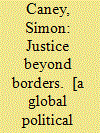

|
|
|
|
|
| Publication |
Oxford, Oxford University Press, 2005.
|
| Description |
319p.
|
| Standard Number |
019829350X
|
|
|
|
|
|
|
|
|
|
|
|
Copies: C:1/I:0,R:0,Q:0
Circulation
| Accession# | Call# | Current Location | Status | Policy | Location |
| 050368 | 341.01/CAN 050368 | Main | On Shelf | General | |
|
|
|
|
| 10 |
ID:
095102
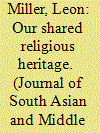

|
|
|
| 11 |
ID:
153256
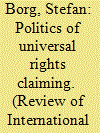

|
|
|
|
|
| Summary/Abstract |
This article contributes to a theoretical understanding of rights claiming as a specific form of political practice. The article develops and defends a post-foundationalist understanding of rights discourse as a way of making a claim to social change through appealing to a universal and illustrates such an understanding with the contestation over women’s rights in post-revolutionary Tunisia. To develop this argument, the article draws on Jacques Rancière’s notion of political subjectification and Ernesto Laclau’s engagement with the relation between the universal and the particular. To examine the relevance of such conceptualisation, the article turns to the struggle over women’s rights in post-revolutionary Tunisia, where secular and sacred understandings of the universal have been invoked frequently through rights discourse. In this context it is shown that claims to the universal give rhetorical force to rights discourse, and instead of depoliticising social relations, which rights discourse is often charged with, such claims are vital for political efficacy. However, whereas Laclau’s position helps us to understand rights as a language of resistance, a more robust defence of the universal is needed to defend rights in terms of emancipatory political change. To pursue this argument, the article turns to Rancière’s defence of axiomatic equality.
|
|
|
|
|
|
|
|
|
|
|
|
|
|
|
|
| 12 |
ID:
121841
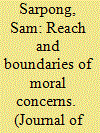

|
|
|
|
|
| Publication |
2013.
|
| Summary/Abstract |
The British government's recent threat to withhold aid from African governments that do not reform legislation banning homosexuality has generated a lot of resentment from African countries where homosexuality is still illegal. With supposedly different social norms and values, Africa's anti-gay stance is largely seen as being precipitated by its cultural values. Whilst Britain and, more recently, the US and Canada, have all determined that the issue of homosexuality lies at the heart of human rights, many African countries have stressed that it boils down to cultural values and social norms, a notion which many Africans believe Western governments have failed to appreciate.
The purpose of this paper is to provide an insight into this issue. It examines whether patterns of particular culture are really incompatible with admitted standards of human rights. The paper also dwells on the debate raging over universal human rights and cultural differences. It concludes that the culture of transnational modernity, one that specifies procedures for collaborative decision-making, conceptions of global social justice, and definitions of gender and sexual roles, stands at risk if it fails to take into account cultural specificity in some regions.
|
|
|
|
|
|
|
|
|
|
|
|
|
|
|
|
| 13 |
ID:
101738
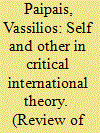

|
|
|
|
|
| Publication |
2011.
|
| Summary/Abstract |
This article is principally concerned with the way some sophisticated critical approaches in International Relations (IR) tend to compromise their critical edge in their engagement with the self/other problematique. Critical approaches that understand critique as total non-violence towards, or unreflective affirmation of, alterity risk falling back into precritical paths. That is, either a particularistic, assimilative universalism with pretensions of true universality or a radical incommensurability and the impossibility of communication with the other. This is what this article understands as the paradox of the politics of critique. Instead, what is more important than seeking a final overcoming or dismissal of the self/other opposition is to gain the insight that it is the perpetual striving to preserve the tension and ambivalence between self and other that rescues both critique's authority and function.
|
|
|
|
|
|
|
|
|
|
|
|
|
|
|
|
| 14 |
ID:
121135
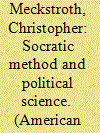

|
|
|
|
|
| Publication |
2012.
|
| Summary/Abstract |
This article advances a novel theoretical account of what a "method" is and what makes one "rigorous," and shows how it could advance contemporary debates in political theory and empirical methodology. Plato's Socrates invented the notion of method, and his characteristic practice of immanent refutation through questioning escapes key problems in more familiar views. Socratic method is (1) antifoundational, (2) non-algorithmic, and (3) indirect and relative to competing hypotheses, and it (4) develops its own standards of objectivity from the logic of asking questions. The article reconstructs Socrates' method from the Platonic texts and shows how it provides reasonable criteria for judgment while remaining critical, sensitive to difference, and open to innovation. Socratic method avoids a forced choice between universalism and particularism in political theory, and it provides a common language for evaluating both quantitative and qualitative methods by drawing out a critical logic of empirical inquiry shared by both.
|
|
|
|
|
|
|
|
|
|
|
|
|
|
|
|
| 15 |
ID:
164324
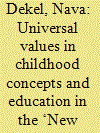

|
|
|
|
|
| Summary/Abstract |
The tension between universal and local values is reflected in educational discourse in every period and society. The education of children serves to strengthen national identity and local culture in the face of globalising trends. This article examines the position and influence of western childhood images and pedagogical concepts, developed mainly from the eighteenth century onward, on the concepts and attitudes of educators of the Jewish national revival in the Land of Israel at the beginning of the twentieth century. Its focus is on the period in which the Hebrew educational system was founded, and children were valued as the future generation that would materialise the adults’ national hopes.
|
|
|
|
|
|
|
|
|
|
|
|
|
|
|
|
| 16 |
ID:
185224
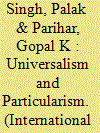

|
|
|
|
|
| Summary/Abstract |
This paper analyzes the conflictual relation that the concepts of “Universalism” and “Particularism” share and how the debate informs our understanding of human rights. To study the concept further, the paper takes the case of the current COVID-19 pandemic to explore the tensions and possible assimilations between universalistic and particularistic frameworks using empirical evidence to explore the intersectional impact on human rights in current times.
|
|
|
|
|
|
|
|
|
|
|
|
|
|
|
|
| 17 |
ID:
159408
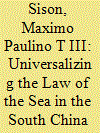

|
|
|
|
|
| Summary/Abstract |
This article argues that a resolution of the maritime disputes in the South China Sea must be based upon a universalist framework where the maritime interests of the world are upheld. The article discusses the universalist framework of the 1982 United Nations Convention on the Law of the Sea (UNCLOS) and the universalist approach taken by the Tribunal on 12 July 2016 in the South China Sea Arbitration regarding the extinguishment of a state's “exceptionalist” maritime claims and the adoption of strict criteria for the characterization of features at sea.
|
|
|
|
|
|
|
|
|
|
|
|
|
|
|
|
| 18 |
ID:
115265
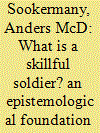

|
|
|
|
|
| Publication |
2012.
|
| Summary/Abstract |
How do we understand military skill/skills, what is it to be militarily skilled, and how do we acquire military skill/skills? Answering these three questions is essential to understanding the ongoing military transformation of developed Western countries. Universalism and contextualism (two competing ethical/epistemological positions) are used to sketch out a typological framework for explaining how different military paradigms/concepts treat "good" soldiering. Universalism is strongly connected with the traditional military paradigm of static invasion-based defense, while contextualism is connected to flexible expeditionary force-based defenses of the twenty-first century. Transformative changes over the past decade illustrate the value of the contextualist paradigm, suggesting that the universalist paradigm may no longer be useful for a twenty-first century expeditionary force.
|
|
|
|
|
|
|
|
|
|
|
|
|
|
|
|
| 19 |
ID:
096265
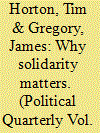

|
|
|
|
|
| Publication |
2010.
|
| Summary/Abstract |
Reporting on our recent book, The Solidarity Society, this article explores the way in which the design of welfare programmes interacts with and shapes the underlying quality of social relations between members of society-and, through this, public attitudes to welfare. Given that sustaining generous welfare over long timescales requires the support of electorates, this 'relational' dimension of welfare policy is crucial for the long-term strategy of tackling poverty and inequality. The article looks in particular at the 'welfare dilemmas' that can arise from tensions between targeting and universalism and between need and entitlement, where the distributional and relational elements of welfare policy work against one another. We conclude that entrenching a generous welfare settlement will require strong elements of both universalism and reciprocity in the design of welfare.
|
|
|
|
|
|
|
|
|
|
|
|
|
|
|
|
|
|
|
|
|